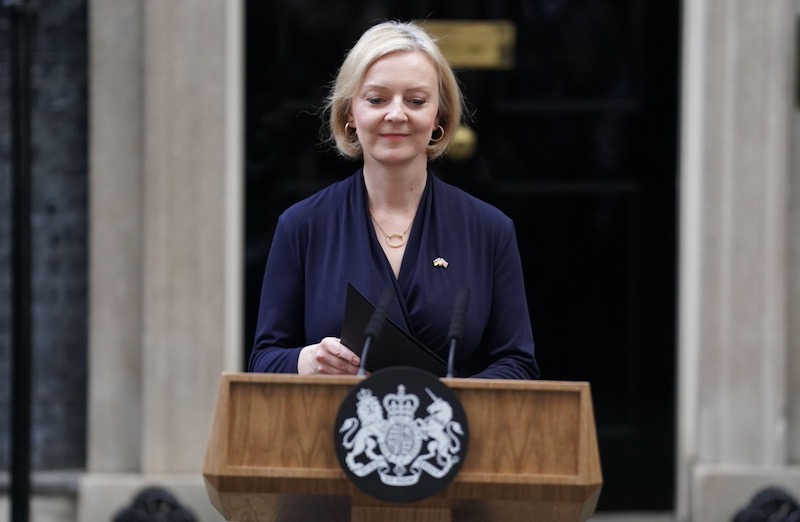There is nothing quite as dangerous as a bad idea. Two Popes knew this – Joseph Ratzinger, who said it, Karol Wojtyla who felt it deeply. Both Communism and Fascism (and its sub-variant, Nazism), which they both experienced first hand, proved it. So can we interpret the sudden demise of Liz Truss's political career as an immune rejection process, the antibodies of normative English decency attacking the virus of free market economics – a dangerously bad idea if ever there was one? The economist Will Hutton declared: “The dominant intellectual ideology of the last 20 years, free market fundamentalism, and the way it was applied in the financial markets, the efficient market hypothesis, was the biggest intellectual mistake this generation has ever witnessed, arguably the world has ever witnessed.”
It is an ideological virus, and it has infected the Conservative Party, making it sick. But Truss’s failure owed much more to straightforward incompetence in the black arts of political management than to ideological waywardness. Her ideas, in more competent hands, might have prevailed. The British are inclined to neither ideological nor philosophical reflection: as one Times editor is reported to have said, to get an Englishman to take an idea seriously you have to fire it into his skull with both barrels from a range of five inches.
Take, for instance, her saying repeatedly that people must stop viewing economic policy “through the lens of redistribution”. Qui bono? The sort of elderly middle-England Tory party members who liked her when she said it. And they put her in 10 Downing Street for it. For redistribution is code for levelling up, for taking from the better off – in the Tory south of England, for instance – to help the less well-heeled who live, for instance, in the north.
Economists will point out that enriching the latter does not necessarily mean impoverishing the former. In other words it is not necessarily a zero-sum calculation: if you can grow a bigger pie, to use one of her metaphors, the slice of it each person gets will be bigger too. But that is not redistribution, not the thing she was attacking. Her real target was the idea that inequality (beyond a certain point) is a social evil and an injustice that governments have a duty to correct. It is a rejection of the very idea of social justice.
How do I know this? Because I know the people she has been listening to. Under her, and even long before her, the Tory regime was infiltrated by deeply committed neoliberal economists from a network of right-wing think-tanks such as the Taxpayers’ Alliance, the Adam Smith Institute and the Institute of Economic Affairs. Their guiding prophet was the Austrian School economist and philosopher Friedrich Hayek, whose great adversary was John Maynard Keynes and whose real target was the State as an agent of justice. The whole notion of a “smaller State”, which lay at the centre of Truss's political creed, was derived from Hayek and his Austrian compatriot Ludwig von Mises.
States, they believed, are by nature totalitarian and oppressive, inimical to human freedom, stranglers of initiative, agents of depressing conformity. So free market economics became a kind of right wing liberation theology, rescuing humankind from the “road to serfdom” (the title of one of Hayek’s most influential books). And they just happen to benefit precisely the sort of people that Truss needed to vote for her in the Tory leadership election this summer. They don’t necessarily reject social justice or want greater inequality per se, they just like the idea of paying the lower taxes which her small-state ideology promises them. And “freedom”, whatever it means, sounds good.
What she and her think-tank allies were trying to do was to redefine Conservatism in their own image, the party of the small state, deregulation and low taxes. Indeed, many Tories seem to be agonising over the loss of this definition of themselves by virtue of her volte face over economic policy, when the currency and bond markets reacted disastrously to the so-called mini-budget her Chancellor of the Exchequer and soul mate Kwasi Kwarteng unveiled last month. If we are not for a small state and lower taxes then what are we for, they ask? The fact they could see no better way to be a Conservative was a measure of the extent to which the right-wing think tanks had succeeded.
Britain is a post-Protestant and non-ideological secular nation, and it is not obvious to it, therefore, what this is all about. It is in fact a deliberate repudiation not of Communism and Fascism, but of Catholic Social Teaching. It is a compliment to the Catholic Church that its teaching is regarded as so significant as to be worth attacking, but that may be because it is thought to be more insidious than Communism and Fascism, less obviously wrong and therefore more dangerous.
Catholic Social Teaching cannot be reconciled with Hayekian small-state low-tax Conservatism. Yet there are outlier Catholic economists, mainly on the right and mainly American, who think otherwise. They promote a distorted and deviant version of Catholic Social Teaching that involves picking a way through the social encyclicals, extracting the bits they like and ignoring the rest. As the texts are full of balancing contrasts, they can usually find the ammunition they are looking for. Their favourite is subsidiarity, which they purport to be an endorsement of family life; solidarity they are not so keen on, though if it occurs at all it should be expressed through voluntary donations to worthy causes, not through government action. The warnings about the dangers of unbridled capitalism and laissez faire economics, especially to the poor, they quickly skip over.
Liz Truss has just seen a demonstration of how powerful market forces can be, for they knocked her off her perch in an afternoon. Catholic Social Teaching has always recognised that market forces, if not kept in check, can be seriously and overwhelmingly damaging to the common good. They may encourage economic growth, but they also encourage inequality and relative poverty. In late 19th century Britain, for instance, and mid-20th century South America, they were the cause of real poverty of the most abject kind. Economic freedom leads prosperity for some, but destitution for others. So let us, say the free marketeers, dismantle the very language of social justice, calling it, as Hayek did, an absurd magical superstition. Then it cannot be used to attack us.
And that is why the State has a right and duty to intervene, as it can command State power, the only means strong enough to resist the impoverishing effect of market forces at their most rampant. Private philanthropy doesn't even come close. Many quotes from the tradition are available but one may suffice. The Vatican II document Gaudium et Spes declared that while “political authority... must always be exercised within the limits of the moral order and dedicated towards the common good”, nevertheless “the complex circumstances of our day make it necessary for the public authority to intervene more often in social, economic and cultural matters”. There is no mandate for small-state low-regulation free markets in Catholic Social Teaching.
Hence the dramatic fall of Liz Truss from the pinnacle of British politics has to be regarded as a major defeat for a bad idea – “the biggest intellectual mistake this generation has ever witnessed”. Let us hope it stays defeated. But I am not sure it will. Several of Truss’s likely successors are of the same mind. This is not the time to drop our guard.



 Loading ...
Loading ...
What do you think?
You can post as a subscriber user ...
User comments (0)